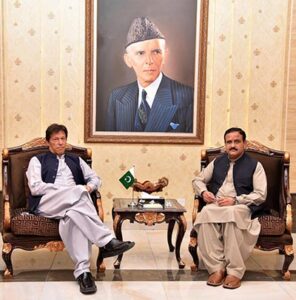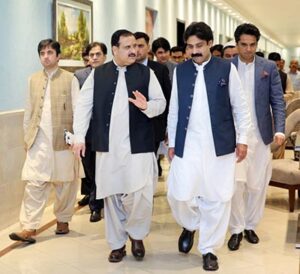Usman Buzdar has become the buzzword in Punjab’s politics since Prime Minister Imran Khan picked him out of the blue to head the provincial government after winning the 2018 general elections. Buzdar’s selection as Chief Minister — a position formerly held by an administrator like Shahbaz Sharif and the PPP’s former strongman Ghulam Mustafa Khar — surprised many, particularly those who were aspiring for the coveted political post within the party.
Prominent among those were Aleem Khan, Shah Mahmood Qureshi, Chaudhry Pervaiz Ilahi, Fawad Chaudhry, and sitting Punjab, Governor Chaudhry Mohammad Sarwar. Interestingly outside the PTI fold, criticism of Buzdar’s selection was milder as compared to that within the party — at least to begin with. But from the word go, everyone in the PTI and out of it was trying to gauge the factors that propelled little-known Usman Buzdar to such a position of authority. This was followed by ‘leaks,’ one of which alleged that Usman Buzdar’s wife is a friend of Farah Khan, at whose residence the marriage ceremony of Imran Khan and Bushra Bibi was held. It was also said that Farhan Khan proposed the name of Usman Buzdar for the Punjab Chief Ministership. And there were a host of other speculative stories in this regard.

Imran khan is fully aware that there are people within and outside the party who want Buzdar to be removed and realising this, he sent a strong message to anti-Buzdar elements during two of his recent visits to the Punjab capital Lahore, that no matter what, come what may, Buzdar is there to stay.
This strongly-worded Prime Minister’s message was not only for his party men, his assorted political allies, or the Opposition seeking his removal, but also for the bureaucracy, administration, and his assorted allies.
Imran Khan ignored Fawad Chaudhry’s harsh criticism of the Punjab Chief Minister, who had called him incompetent and challenged his ability to resolve issues confronting the province. Furthermore, all the administrative changes Buzdar made were fully endorsed by the party chief, including the transfer of six Inspector Generals and three Chief Secretaries. Fayyazul Hassan Chohan was removed twice from the position of Punjab Government spokesman and so were Firdous Ashiq Awan, Shahbaz Gill and Mirza Shahzad Akbar.
And there are reports that the Establishment has also expressed its aversion to Buzdar running the Punjab Government, but Imran Khan has stood like a rock to defend him. However, political observers are of the view that those alleged to have brought Imran Khan to power had many options to get rid of Buzdar if they seriously wished to do so. They could, for example have used the judiciary and National Accountability Bureau (NAB) to throw him out. However, they argue, the impression that there have been differences between the Establishment and the PTI leadership on Buzdar is nothing but camouflage. In their opinion, Buzdar suits the Establishment the most for various reasons, among these that he gets to take the blame for its failures. The Establishment apparently tacitly concurs with this view.
There is reportedly near consensus among Establishment circles that a weak administration suits it because it is unable to take independent and steadfast decisions. They term Buzdar a ‘guest actor’ who falls in line and does as he is asked to.

Usman Buzdar’s remaining term in office is, of course, linked with his boss Imran Khan’s term as Prime Minister. Khan’s allies in the Punjab, particularly, the Pakistan Muslim League (Q) under Pervaiz Illahi now accept this since all their demands have been met, the last being Moonis Illahi’s appointment as Federal Minister. But it is still difficult to assume that this acceptance will endure for the remaining period of the PTI’s term in office.
Meanwhile, the most controversial issue remains why the Opposition has been holding back from bringing about an in-house change? No political party has come up with a plausible answer to this million-dollar question. The Nawaz League being the main stakeholder has remained silent on this issue for nearly three years. Maryam Nawaz’s public statement that her party would rather like the PTI government to complete their tenures both, in the Punjab and Centre has raised many eyebrows. Recent speculation that the Establishment is trying to cobble together some sort of deal with Nawaz Sharif that would pave the way for the latter to return to Pakistan have provided some clue as to why the PML-N has not even initiated an attempt to topple Buzdar’s government in the Punjab.
Circles close to the Nawaz Sharif camp in London have confided, on the condition of anonymity, that the PML-N does not wish to inherit and carry PTI’s failings — among them the existing economic crisis with skyrocketing prices and the toughest-ever International Monetary Fund (IMF) pre-conditions. Nawaz Sharif has quite categorically shared his perceptions with ‘negotiators’ about the ground realities in the country and suggested that Imran Khan will have to be removed from the office of the Prime Minister through an in-house change. Following that, Sharif says, whoever replaces him should dissolve the assemblies and announce dates for fresh general elections.
In his opinion, any party which could steer the country out of its worst-ever economic crisis would need a fresh five-year mandate to formulate short-term and long-term policies. However, Nawaz made no bones about the fact that he realised putting the country back on track was an uphill task. Another important issue is the current nature of the relationship of the PTI’s top leadership with the Establishment, which according to political pundits, was instrumental in bringing Imran and his party to the corridors of power. The controversy that began with the appointment of the new Director-General Inter-Services Intelligence (DG-ISI) has not died down. Commenting on this, a retired brigadier said: “It is in the DNA of the military that orders, once passed and made public, have to be implemented by all means.” This implementation of orders in letter and spirit became evident with the DG-ISI’s transfer and all the other postings and transfers.
Some analysts are now saying that the results of the Local Body (LB) elections in Khyber-Pukhtoonkhwa (KP) are a glaring example of growing bitterness, from the hitherto very cordial relations, between the PTI and the Establishment. The PTI is facing an even greater challenge in the Punjab where LB polls are due to be held. Imran Khan is now vowing to learn from the mistakes made in KP and has decided to issue party tickets under his supervision.
Khan’s greatest dilemma is that his party lost the by-elections in the Punjab, and even a seat in Nowshera, and the recently held LB polls in KP due to internal groupings. In KP, Chief Minister Mahmood Khan, Defence Minister Pervaiz Khattak, and Speaker National Assembly, Asad Qaisar, each headed their own group. This in addition to many other small groups. They issued tickets to their dear and near ones, leading to a shameful defeat for the PTI at the hands of the Jamiat Ulma-e-Islam (JUI). The PTI in Punjab is also divided into similar groups and if the split continues, the results in Punjab LB polls in Punjab could be horrifying.
Against this backdrop, one can easily understand why Premier Imran Khan said the next three months are crucial. Does that mean something unexpected is going to happen? That is a million-dollar question begging an answer.

The writer is a veteran journalist, who is working as the Chief Editor of City42 Group’s Digital Media. He has served as the editor of Pakistan’s leading English-language dailies, The News and The Nation.

